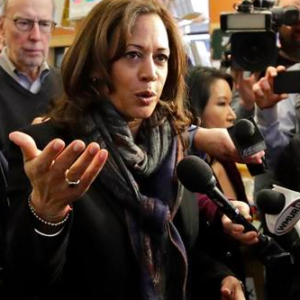Sen. Kamala Harris (D-Calif.) dropped out of the Democratic primary race, after nearly a year of flattering coverage from the news media praising her as the “favorite” and “frontrunner.”
The media wanted Kamala Harris. But it turns out Democratic voters didn’t.
A quick scan of January headlines from The New York Times, FiveThirtyEight, Politico, CNN and NBC shows that right from the start, Harris was the media favorite.
Upon the launch of her campaign in January, FiveThirtyEight ran a piece claiming “there may be no other candidate who better embodies how the modern Democratic Party has changed over the last few decades in identity and ideology.”
FiveThirtyEight’s political reporter and analyst Nate Silver — who is also a special correspondent for ABC News — said Harris and Beto O’Rourke “may have more upside” than Sanders and Biden. Today, Harris and O’Rourke are out, while Sanders and Biden are among the four frontrunners, according to polls.
The New York Times ran an opinion piece headlined, “Kamala Harris, Call-Out Star,” subtitled with “The toughest progressive we’ve seen in a long time” (progressives dispute this claim).
Less than 10 days earlier, the Times ran an opinion titled, “Kamala Harris, A Front Runner,” by David Leonhardt, the former Washington bureau chief for the Times who currently writes a Times newsletter.
“By formally entering the presidential race, Harris immediately becomes one of the front-runners for the Democratic nomination,” Leonhardt wrote. “As Nate Silver recently explained, Harris has the potential to fare well among several of the five big Democratic constituencies: party loyalists; hard-core progressives; young voters; African-Americans; and Hispanic and Asian-American voters. So take her candidacy seriously.”
Unsurprisingly, Democratic progressives flocked to very progressive presidential candidates Bernie Sanders (I-Vt.) and Elizabeth Warren (D-Mass.) instead of Harris, who couldn’t seem to decide if she was running as a center-left or far-left candidate. As the New York Times conceded, “At times, Ms. Harris has created confusion by oscillating between policy positions.”
An Atlanta reader told Leonhardt that a big priority for Democrats in 2020 will be “Unions, unions, and more unions.” But Harris never built momentum from union support. Sanders and Warren did, and Trump continues to do so since he lured union voters away from the Democratic party in 2016.
In June, the Times ran a news article headlined “What Kamala Harris Believes,” subtitled “The Democratic candidate wants relevant policy, not a ‘beautiful sonnet.’ Is that enough for voters?”
The subtitle essentially discredits Democratic voters who didn’t want Harris — which is to say, most of them. Other than a brief window when Harris peaked at 15 percent support from Democratic voters, she spent most of the campaign polling in single digits.
Another Times opinion claimed that “The Who-Can-Beat-Trump Test Leads to Kamala Harris,” despite multiple polls as early as January citing Sanders as the most likely Democratic contender to beat Trump.
But The New York Times wasn’t the only publication promoting Harris. Politico Magazine ran a news article titled, “How Kamala Harris Won the Rollout Primary” in January, and another news article describing MSNBC’s Rachel Maddow as the new “Democratic kingmaker,” highlighting Maddow’s prediction that “there’s a good chance [Harris] will win the nomination.”
In February, CNN political analyst Harry Enten called Harris the frontrunner and tweeted she “checks off a lot of boxes, if you were building the type of candidate who would win a Dem primary from scratch.”
Jennifer Rubin, a political commentator for The Washington Post, wrote a flattering piece for the Post praising Harris’ launch and called her September debate performance “emotionally riveting” while continuing to support Harris on Twitter throughout her campaign’s run.
Despite political commentators’ and left-leaning news publications’ love for Harris and conviction that voters would love her too, she never really broke out. She stumbled along behind former Vice President Joe Biden, Sanders and Warren, who have continued to garner strong support from the Democratic voter base.
But you’d never know it from reading the Times or Politico or the Post unless you looked at the polling numbers yourself.
Ironically, in his January column, Leonhardt said, “I would encourage you to mostly ignore whether she is likely to win and focus your attention instead on whether she deserves to win. Make your own decisions about the candidates, rather than trying to guess what other voters will do.”
Maybe he should have addressed that last line to the news media.

